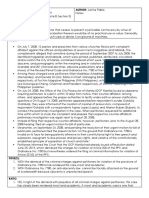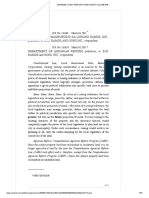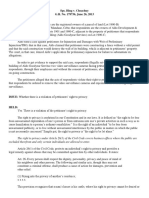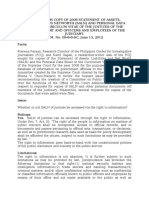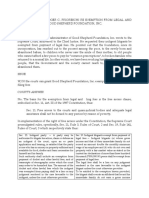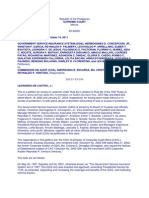Sereno vs. CTRM
Sereno vs. CTRM
Uploaded by
Luigi JaroCopyright:
Available Formats
Sereno vs. CTRM
Sereno vs. CTRM
Uploaded by
Luigi JaroOriginal Description:
Copyright
Available Formats
Share this document
Did you find this document useful?
Is this content inappropriate?
Copyright:
Available Formats
Sereno vs. CTRM
Sereno vs. CTRM
Uploaded by
Luigi JaroCopyright:
Available Formats
FACTS:
The Committee on Tariff and Related Matters (CTRM) held a meeting in which it resolved to
recommend to President Golria Macapagal-Arroyo the lifting of the suspension of the tariff
reduction schedule on petrochemicals and certain plastic products. Letters to request for a copy
of the minutes of the meeting were made by the Association of Petrochemical Manufacturers in
the Philippines (APMP) to understand the basis for CTRMs recommendation that allegedly
caused tremendous losses to the petrochemical industry. CTRMs continued refusal to deliver the
requested documents prompted the APMP to bring the petition for mandamus in the RTC.
ISSUE:
Whether or not the CTRM may be compelled by mandamus to furnish the petitioner with a copy
of the minutes of the May 23, 2005 meeting based on the constitutional right to information on
matters of public concern and the States policy of full public disclosure?
RULING:
NO. The peoples right to information is not absolute. According to Legaspi v. Civil Service
Commission, the constitutional guarantee to information does not open every door to any and
all information. It is limited to matters of public concern, and is subject to such limitations as
may be provided by law. Likewise, the States policy of full public disclosure is restricted to
transactions involving public interest, and is further subject to reasonable conditions prescribed
by law.
NOTE (Do not copy):
Two requisites must concur before the right to information may be compelled by writ of
mandamus. Firstly, the information sought must be in relation to matters of public concern or
public interest. And, secondly, it must not be exempt by law from the operation of the
constitutional guarantee.
As to the first requisite, there is no rigid test in determining whether or not a particular
information is of public concern or public interest. As such, is left to the proper determination of
the courts on a case to case basis. As for the second requisite, the respondents claim (and the
court agrees) exemption on the ground that the May 23, 2005 meeting was classified as a closed-
door Cabinet meeting by virtue of the committees composition and the nature of its mandate
dealing with matters of foreign affairs, trade and policy-making. They assert that the information
withheld was within the scope of the exemption from disclosure because the CTRM meetings
were directly related to the exercise of the sovereign prerogative of the President as the Head of
State in conduct of foreign affairs and the regulation of trade.
You might also like
- White Light Corp Vs City of Manila (Updated Digest)Document3 pagesWhite Light Corp Vs City of Manila (Updated Digest)GR100% (10)
- Madrilejos V Gatdula - Digest PDFDocument2 pagesMadrilejos V Gatdula - Digest PDFJustine Joy Pablo75% (8)
- Genuino v. de LimaDocument3 pagesGenuino v. de LimaAntonio Rebosa100% (4)
- 15) Valmores V AchacosoDocument2 pages15) Valmores V AchacosoAlfonso Miguel Lopez100% (2)
- PBM Employees Association v. Philippine Blooming Mills PDFDocument4 pagesPBM Employees Association v. Philippine Blooming Mills PDFKJPL_198767% (3)
- Civ Pro - 6TH-2-CASESDocument4 pagesCiv Pro - 6TH-2-CASESJireh Dela Vega Agustin100% (2)
- Manapat Vs CADocument3 pagesManapat Vs CAEdz Votefornoymar Del Rosario100% (5)
- Non v. Dames II - DigestDocument4 pagesNon v. Dames II - DigestKim B.No ratings yet
- Social Justice 645 SCRA 401Document57 pagesSocial Justice 645 SCRA 401Dah RinNo ratings yet
- NDC Vs PVB (Digest)Document2 pagesNDC Vs PVB (Digest)Arjay Balanquit100% (5)
- Baguio Midland Courier v. CA Freedom of Expression - LibelDocument3 pagesBaguio Midland Courier v. CA Freedom of Expression - LibelRowardNo ratings yet
- Digest Manalo Vs CalderonDocument3 pagesDigest Manalo Vs CalderonLoraine FerrerNo ratings yet
- Issue: May The Incumbent Chief Executive Be Haled To Court Even For The Limited Purpose Under The Rules On The Writ ofDocument2 pagesIssue: May The Incumbent Chief Executive Be Haled To Court Even For The Limited Purpose Under The Rules On The Writ ofGrey Gap TV82% (11)
- SPARK Vs QUEZON CITYDocument2 pagesSPARK Vs QUEZON CITYMichael Renz Palabay100% (3)
- NPC Vs Posada, G.R. No. 191945Document3 pagesNPC Vs Posada, G.R. No. 191945Aileen Peñafil100% (1)
- Bungcaras Vs Comelec Case Digest - LuigiDocument1 pageBungcaras Vs Comelec Case Digest - LuigiLuigi JaroNo ratings yet
- Trump Shakedown and CoverupDocument4 pagesTrump Shakedown and Coverupacohnthehill81% (77)
- Corporate Information: (Agensi Di Bawah KPDNHEP)Document6 pagesCorporate Information: (Agensi Di Bawah KPDNHEP)Leow Zi Liang100% (1)
- Sereno Vs CTRM Digest Right On Matter Digest AdvinculaDocument2 pagesSereno Vs CTRM Digest Right On Matter Digest AdvinculaAbby Perez100% (1)
- Two (2) Requisites Must Concur Before The Right To Information May Be Compelled by Writ of Mandamus.-Two RequisitesDocument1 pageTwo (2) Requisites Must Concur Before The Right To Information May Be Compelled by Writ of Mandamus.-Two RequisitesTin LicoNo ratings yet
- 4 Ayer Productions v. CapulongDocument5 pages4 Ayer Productions v. CapulongCedrick100% (1)
- Meralco Vs PSCDocument2 pagesMeralco Vs PSCJoycee ArmilloNo ratings yet
- Social Justice Secretary V Dangerous Drug Board GR No 157870Document2 pagesSocial Justice Secretary V Dangerous Drug Board GR No 157870Mary Leanda100% (5)
- Guiyab v. PeopleDocument1 pageGuiyab v. PeopleSamantha Ann T. TirthdasNo ratings yet
- Sps. Hing v. Choachuy (Case Digest)Document2 pagesSps. Hing v. Choachuy (Case Digest)Christy Anne100% (4)
- Re Request For Copy of 2008 Statement of Assets Liabilities and Networth Saln and Personal Data Sheet Orcurriculum Vitae of The Justices of The SuDocument2 pagesRe Request For Copy of 2008 Statement of Assets Liabilities and Networth Saln and Personal Data Sheet Orcurriculum Vitae of The Justices of The SuJessamine OrioqueNo ratings yet
- Southern Hemisphere v. Anti-Terrorism CouncilDocument4 pagesSouthern Hemisphere v. Anti-Terrorism CouncilAiza Giltendez100% (2)
- Orquiola v. Tandang Sora Devt. Corp Case DigestDocument3 pagesOrquiola v. Tandang Sora Devt. Corp Case DigestAngela P. SenoraNo ratings yet
- Borjal vs. CADocument3 pagesBorjal vs. CAJm Santos100% (1)
- People vs. de Gracia - G. R. Nos. 102009-10 (Case Digest)Document2 pagesPeople vs. de Gracia - G. R. Nos. 102009-10 (Case Digest)Abigail TolabingNo ratings yet
- Re - Query of Mr. Roger C. Prioreschi Re Exemption From Legal and Filing Fees of The Good Shepherd Foundation, Inc.Document3 pagesRe - Query of Mr. Roger C. Prioreschi Re Exemption From Legal and Filing Fees of The Good Shepherd Foundation, Inc.rbNo ratings yet
- CIR Vs PetronDocument2 pagesCIR Vs PetronfranzadonNo ratings yet
- Consti 2: Case Digests - Regado: Home Building & Loan Assn. V BlaisdellDocument6 pagesConsti 2: Case Digests - Regado: Home Building & Loan Assn. V BlaisdellAleezah Gertrude Regado100% (1)
- People v. Fajardo (GR No. L-12172 Aug 29, 1958)Document2 pagesPeople v. Fajardo (GR No. L-12172 Aug 29, 1958)Ei Bin100% (3)
- CONSTI2 - MTRCB v. ABS-CBNDocument2 pagesCONSTI2 - MTRCB v. ABS-CBNdelayinggratificationNo ratings yet
- Chavez v. PCGGDocument1 pageChavez v. PCGGJoe Cura100% (2)
- Case Digest: Valmonte Vs BelmonteDocument4 pagesCase Digest: Valmonte Vs BelmonteKIM COLLEEN MIRABUENA100% (1)
- Written Assignment 3 - Professional Attire MemorandumDocument3 pagesWritten Assignment 3 - Professional Attire Memorandumapi-330212115No ratings yet
- Consti Sept 19Document8 pagesConsti Sept 19Ynna GesiteNo ratings yet
- SkdjksDocument4 pagesSkdjksBea Czarina NavarroNo ratings yet
- United States v. Ong Siu HongDocument1 pageUnited States v. Ong Siu HongRam AdriasNo ratings yet
- Case Digest - A.M.-No.-P-02-1651Document3 pagesCase Digest - A.M.-No.-P-02-1651Jenny100% (1)
- GSIS V MontesclarosDocument2 pagesGSIS V MontesclarosojhosakaNo ratings yet
- Pp. vs. SBDocument2 pagesPp. vs. SBemmaniago08No ratings yet
- 705 - US v. Navarro Case DigestDocument1 page705 - US v. Navarro Case DigestAlvin Earl Nuyda100% (2)
- People v. FigueroaDocument2 pagesPeople v. FigueroaIldefonso HernaezNo ratings yet
- Gsis V CoaDocument7 pagesGsis V CoajerushabrainerdNo ratings yet
- IVA6 People V GoDocument5 pagesIVA6 People V GoCedric KhoNo ratings yet
- VALMONTE V BELMONTEDocument3 pagesVALMONTE V BELMONTEGail CariñoNo ratings yet
- Noel vs. CA (240 SCRA 78)Document3 pagesNoel vs. CA (240 SCRA 78)KPPNo ratings yet
- People Vs Galit Case DigestDocument1 pagePeople Vs Galit Case DigestApril Dream Mendoza Pugon80% (5)
- Qdoc - Tips - 2 3 People V MuletaDocument2 pagesQdoc - Tips - 2 3 People V MuletaLEANNE RUMBAOA100% (1)
- DPWH Vs QUIWADocument2 pagesDPWH Vs QUIWAmiles1280100% (1)
- 40 BELTRAN v. SAMSONDocument2 pages40 BELTRAN v. SAMSONAerith Alejandre100% (3)
- Sumulong Vs GuerreroDocument2 pagesSumulong Vs GuerreroJen DeeNo ratings yet
- Malabanan vs. Ramento PDFDocument2 pagesMalabanan vs. Ramento PDFKJPL_1987100% (1)
- Ayer Productions Pty. Ltd. v. CapulongDocument4 pagesAyer Productions Pty. Ltd. v. CapulongNoreenesse Santos100% (1)
- 5 Letter of Tony Q. V Alenciano - Holding of Religious Rituals at The Hall of Justice Building in Quezon CityDocument2 pages5 Letter of Tony Q. V Alenciano - Holding of Religious Rituals at The Hall of Justice Building in Quezon CityRex0% (1)
- Admin Law Part 2 of 7Document37 pagesAdmin Law Part 2 of 7jeanvaljean999No ratings yet
- IDEALS v. PSALM G.R. No. 192008right To InformationDocument2 pagesIDEALS v. PSALM G.R. No. 192008right To InformationAbby PerezNo ratings yet
- Sereno v. Committee On Trade and Related Matters (G.R. No. 175210)Document4 pagesSereno v. Committee On Trade and Related Matters (G.R. No. 175210)Joseph Sebastian JavierNo ratings yet
- OCG Writes To PM Golding, Re: Government of Jamaica Privatization Policy and Procedures - Acceptance of Unsolicited ProposalsDocument8 pagesOCG Writes To PM Golding, Re: Government of Jamaica Privatization Policy and Procedures - Acceptance of Unsolicited ProposalsOG.NRNo ratings yet
- Lascano, Tito C. LOURDES T. MARQUEZ, Petitioner, vs. HON. ANIANO A. DESIERTO, Et Al, Respondents. FactsDocument6 pagesLascano, Tito C. LOURDES T. MARQUEZ, Petitioner, vs. HON. ANIANO A. DESIERTO, Et Al, Respondents. FactsBryan Albert SuerteNo ratings yet
- B3) People Vs Rodriguez G.R. No. 7123. August 17, 1912Document2 pagesB3) People Vs Rodriguez G.R. No. 7123. August 17, 1912Luigi JaroNo ratings yet
- Conspiracy Case DigestsDocument4 pagesConspiracy Case DigestsLuigi JaroNo ratings yet
- A Quick (And Very Informal) Guide To Thesis: Prepared By: Luigi Jaro and Jehanne TupasDocument21 pagesA Quick (And Very Informal) Guide To Thesis: Prepared By: Luigi Jaro and Jehanne TupasLuigi JaroNo ratings yet
- Highlights of The Revised Corporation CodeDocument22 pagesHighlights of The Revised Corporation CodeLuigi JaroNo ratings yet
- Second Division People of The PhilippinesDocument187 pagesSecond Division People of The PhilippinesLuigi JaroNo ratings yet
- Civ-Rev-Case Digest - by LuigiDocument9 pagesCiv-Rev-Case Digest - by LuigiLuigi JaroNo ratings yet
- Poli Case Digest Sept 14, 2020 by LuigiDocument2 pagesPoli Case Digest Sept 14, 2020 by LuigiLuigi JaroNo ratings yet
- January 23 2020 Civil Law Review Case DigestsDocument45 pagesJanuary 23 2020 Civil Law Review Case DigestsLuigi JaroNo ratings yet
- Austria V Reyes Case DigestDocument2 pagesAustria V Reyes Case DigestLuigi Jaro100% (1)
- Nov 23 Case Digests - LuigiDocument5 pagesNov 23 Case Digests - LuigiLuigi JaroNo ratings yet
- Pasay City Allegiance Church Vs Benito Case DigestDocument1 pagePasay City Allegiance Church Vs Benito Case DigestLuigi JaroNo ratings yet
- Purisima Vs Phil Tobacco Case Digest - LuigiDocument1 pagePurisima Vs Phil Tobacco Case Digest - LuigiLuigi JaroNo ratings yet
- Crim Pro Digest August 23Document18 pagesCrim Pro Digest August 23Luigi JaroNo ratings yet
- Protest of Bill of ExchangeDocument2 pagesProtest of Bill of ExchangeLuigi JaroNo ratings yet
- ABS-CBN Broadcasting Corporation vs. Nazareno, GR No. 164156 PDFDocument38 pagesABS-CBN Broadcasting Corporation vs. Nazareno, GR No. 164156 PDFLuigi JaroNo ratings yet
- Deed of Sale of Private Agricultural LandDocument3 pagesDeed of Sale of Private Agricultural LandLuigi JaroNo ratings yet
- ABS-CBN Broadcasting Corporation vs. Nazareno, GR No. 164156Document38 pagesABS-CBN Broadcasting Corporation vs. Nazareno, GR No. 164156Luigi JaroNo ratings yet
- Lazaro vs. Social Security Commission, 435 SCRA 472Document10 pagesLazaro vs. Social Security Commission, 435 SCRA 472Luigi JaroNo ratings yet
- CrimPro Garayblas Vs Ong Case Digest (PreTrial)Document2 pagesCrimPro Garayblas Vs Ong Case Digest (PreTrial)Luigi Jaro100% (1)
- HU-HR IPA CBC Projects Booklet 2013Document99 pagesHU-HR IPA CBC Projects Booklet 2013Jasmina Šantić KočanNo ratings yet
- Timeline of Modern HistoryDocument11 pagesTimeline of Modern Historytradergoldman007No ratings yet
- 2nd Exam Coverage Part 1Document26 pages2nd Exam Coverage Part 1Mhich GeyrozagaNo ratings yet
- General Knowledge: Nicknames of Indian Freedom FightersDocument2 pagesGeneral Knowledge: Nicknames of Indian Freedom FightersDeepu DeepikaNo ratings yet
- Lapanday Workers' Union vs. NLRC DigestDocument3 pagesLapanday Workers' Union vs. NLRC DigestMichelle Montenegro - AraujoNo ratings yet
- Chapter 5Document55 pagesChapter 5Lisa ImranNo ratings yet
- Guidelines Jnnurm Bsup IhsdpDocument26 pagesGuidelines Jnnurm Bsup Ihsdptaniachopra50% (2)
- Gideon Kanner and Michael M. Berger, The Nasty, Brutish, and Short Life of Agins v. City of Tiburon, 50 Urb. Lawyer 1 (2019)Document40 pagesGideon Kanner and Michael M. Berger, The Nasty, Brutish, and Short Life of Agins v. City of Tiburon, 50 Urb. Lawyer 1 (2019)RHTNo ratings yet
- KISI-KISI STS I PEND. PANCASILA KELAS 6 - Yusuf PratamaDocument6 pagesKISI-KISI STS I PEND. PANCASILA KELAS 6 - Yusuf PratamaMutiaraNo ratings yet
- NCC Official Residences ReportDocument74 pagesNCC Official Residences ReportCTV OttawaNo ratings yet
- The Case Against Democracy - The New YorkerDocument9 pagesThe Case Against Democracy - The New Yorkersarwar sons100% (1)
- YahooDocument167 pagesYahooAndrewNo ratings yet
- International Law Assignment: Submitted by Rimel Khan Mdds 2Document9 pagesInternational Law Assignment: Submitted by Rimel Khan Mdds 2ayesha amirNo ratings yet
- Narrative Report - 2016 PDF - 528 PGSDocument536 pagesNarrative Report - 2016 PDF - 528 PGSnivedidha arulselvamNo ratings yet
- Civil Court FormsDocument19 pagesCivil Court FormssanthoshputhoorNo ratings yet
- Bayan v. Zamora, G.R. No. 138570, October 10, 2000Document4 pagesBayan v. Zamora, G.R. No. 138570, October 10, 2000Rea AbonNo ratings yet
- Jurisdiction of CPCDocument17 pagesJurisdiction of CPCMamta100% (1)
- Lokpal - Adr ProjectDocument2 pagesLokpal - Adr ProjectEhsas ManikantNo ratings yet
- Ge 2 Contemporary World (Module 2)Document8 pagesGe 2 Contemporary World (Module 2)perez.arcjeffNo ratings yet
- Edwards Chapter 11Document24 pagesEdwards Chapter 11Michael IlaviaNo ratings yet
- Naciones DivididasDocument30 pagesNaciones Divididasdaniel0alonso0gonz0lNo ratings yet
- Employee Information SheetDocument4 pagesEmployee Information SheetKim Roque-AquinoNo ratings yet
- TAM Membership FormDocument2 pagesTAM Membership FormGobinath GovindasamyNo ratings yet
- Abella vs. Larrazabal: December 21, 1989Document1 pageAbella vs. Larrazabal: December 21, 1989Karen RonquilloNo ratings yet
- Adonis Notes 2011Document169 pagesAdonis Notes 2011Ron GamboaNo ratings yet
- Court Room Decorum - Judge GullDocument3 pagesCourt Room Decorum - Judge GullMatt Blac inc.No ratings yet
- Raytheon International Vs Rouzie GR 162894Document2 pagesRaytheon International Vs Rouzie GR 162894BingoheartNo ratings yet
- Amendment To Succession Act 2024Document4 pagesAmendment To Succession Act 2024ShukrNo ratings yet

